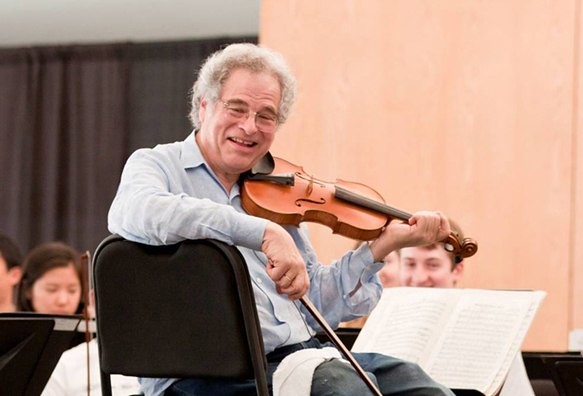“The single most important goal for performing artists is to see how they are doing.”
–Itzhak Perlman
The Musician’s Way, p. 202
Suppose that you’re practicing a new piece. How do you know that one portion is learned securely enough for you to tackle another?
Later on, how do you determine that the music is concert-ready?
Then, following a performance, what enables you to pinpoint the aspects of your execution that need polishing?
The answer, of course, is accurate self-evaluation.
We musicians display our knack for self-evaluation with every phrase that we play or sing. Our performances inescapably reveal whether we hear ourselves and perceive the impact of our delivery.
How do we become expert self-evaluators? Very gradually, it seems. Self-assessment involves constellations of skills, and all of those abilities mature over time.
Wouldn’t it be ideal if we could speed up the maturation process?
Given that music students who lack self-evaluation skills are hamstrung by their obliviousness, I’ve been striving for decades to help rising musicians perceive their work honestly. Below, I sum up five tried-and-true strategies.
“Music students who lack self-evaluation skills are hamstrung by their obliviousness.”
Five Self-Evaluation Strategies for Musicians
1. Practice Accessible Music
Only manageable music leaves us with the mental bandwidth we need to sense every aspect of our execution.
In the words of Robert Schumann, “Endeavour to play easy pieces well and with elegance; that is better than to play difficult pieces badly.” (Schumann, Advice to Young Musicians)
2. Record Yourself
Both in practice and performance, we should regularly employ audio and video recorders, and then evaluate our recordings in targeted ways.
Recommended HD Recorders: Audio: Zoom H4n | Video: Zoom Q2n-4K
With an audio recording of a solo, for instance, we might listen once to a section and assess our rhythm; for a second appraisal we could focus on intonation; on a third pass we might weigh our dynamics, vibrato, articulation, tone, or other expressive effects.
When reviewing a video of a performance, we should gauge our stage presence and also examine whether we display any unfavorable mannerisms such as raised shoulders, facial grimaces, muscular stiffness, or inordinate movements.
3. Assess for Excellence
As we practice, we need to sense whether our actions meet our standards of excellence. Those standards are elaborated on throughout The Musician’s Way, but, in a nutshell, they are: ease, expressiveness, accuracy, rhythmic vitality, beautiful tone, focused attention, and positive attitude.
For example, as we play or sing, we should insist on ease, and never let ourselves push through difficulties or execute phrases at uncontrollable tempos.
Regarding accuracy or the lack thereof, we all make errors, and errors alert us to faults in our preparation. As such, they provide us with crucial feedback, so we mustn’t fear or loathe them.
In response to errors, we should calmly isolate and solve the problems that cause us to misstep. Adopting such an objective attitude is crucial to evaluating our work.
By comparison, musicians who become upset by mistakes tend not to notice many glitches because, unconsciously, they want to avoid upset. As a result, they sometimes heedlessly distort their music rather than refurbish clumsy phrases.
4. Seek Feedback
We learn the most at the edges of our knowledge. And all of us filter what we perceive, so we often can’t evaluate with untarnished objectivity. Other viewpoints, therefore, along with critiques, are crucial to our growth.
When I assess my own work, for instance, I assume that I may be missing something. For that reason, I ask others to read my writing, listen to my playing, critique my concert programming ideas, and so forth.
When a colleague points out something that I’ve overlooked, I rejoice, because I recognize that my awareness has been expanded.
5. Be Detached
We’re passionate about music, but we must evaluate our work somewhat dispassionately, almost as if it weren’t coming from us.
What I mean is that, when we size up our playing of a phrase, we should ask things like, “How was the timing in that melody?” Not how was my timing but how was the timing.
Similarly, if we’re using a mirror or video camera to help with a technical problem at the piano, we should examine the actions of our hands as just hands. Not our hands. Then we can evenhandedly assess whether what we see reflects what we desire.
See pages 112-113 & 204-205 of The Musician’s Way for tables containing dozens of questions we can use to evaluate our practice and performance habits.
Related posts are indexed under the Music Practice category.
© 2010 Gerald Klickstein



I(Alouette)like Mr Perlman’s phrase,”mental bandwidth,” but my violin teacher, Ms Ferguson-Knish, doesn’t like it so much as it reminds her of “bandwich”-which is the generic name for food served to musicians at gigs.
Thanks for the humor – very funny! Please note, though, that I’m to blame for the moniker ‘mental bandwidth.’